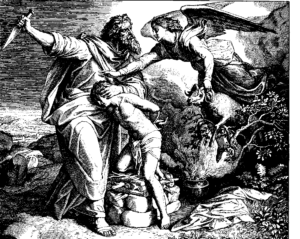The Lord be with you
In his afternoon sermon, delivered on Easter Tuesday, April 3, 1526, Martin Luther considered several Old Testament people and how they prefigured Jesus. I loved this sermon because it is how I like to read the OT. The excerpt below is his treatment of Isaac.
Although the boy [Isaac] was born from man and woman, he was born in such a way that he was born from God’s promise [Gen. 17:15-21]. Thus Paul calls him the boy of promise [Gal. 4:23], not of the flesh, because his mother was barren; but by the power of God she became fruitful. (Hence all the barren women in Scripture are a figure of the virginity of Mary.) Paul stresses that the son of promise is more than the son of flesh, because where God adds His Word, there it must advance. When the boy grew up, [Abraham] was commanded to sacrifice [him]. When [he did] this, he was commanded to let [the boy] live and was shown a buck [to be sacrificed in his place, Gen. 22:1-13]. Thus Isaac is a picture of Christ, who was signified in this history. Christ is much more a Son of the Word than Isaac; although He [was conceived] through the word [of promise], He was born of a woman without a man). But He is so much of the Word, of whom Isaac was a forerunner, that Christ is the Child of the Holy Spirit and the Word, so that He is not subject to the dragon [Rev. 20:2]. He was led [out] to be sacrificed. So there was nothing but death before Isaac’s eyes because his father thought of nothing else; nevertheless, he remained alive in the midst of death. It had been commanded that he be slain, but in the midst of that command he remained alive, and so alive that even seed was promised to (Abraham). For that reason, Isaac was the figure of the true Isaac, who died a natural death like any other man, and the figure of the true Isaac, who died a natural death like any other man, and yet remains alive in death, retains eternal life, and acquires the promise of an eternal kingdom, even of one that has been extended without end.
Thus Isaac is a picture of Christ, who was signified in this history. Christ is much more a Son of the Word than Isaac; although He [was conceived] through the word [of promise], He was born of a woman without a man). But He is so much of the Word, of whom Isaac was a forerunner, that Christ is the Child of the Holy Spirit and the Word, so that He is not subject to the dragon [Rev. 20:2]. He was led [out] to be sacrificed. So there was nothing but death before Isaac’s eyes because his father thought of nothing else; nevertheless, he remained alive in the midst of death. It had been commanded that he be slain, but in the midst of that command he remained alive, and so alive that even seed was promised to (Abraham). For that reason, Isaac was the figure of the true Isaac, who died a natural death like any other man, and the figure of the true Isaac, who died a natural death like any other man, and yet remains alive in death, retains eternal life, and acquires the promise of an eternal kingdom, even of one that has been extended without end.
Thus all of the accounts point to Christ, if not in the words, then in the deeds, because Christ must be sought in all the figures of Scripture and in the hidden meanings.
Martin Luther, Luther’s Works v. 56, p. 174-175
